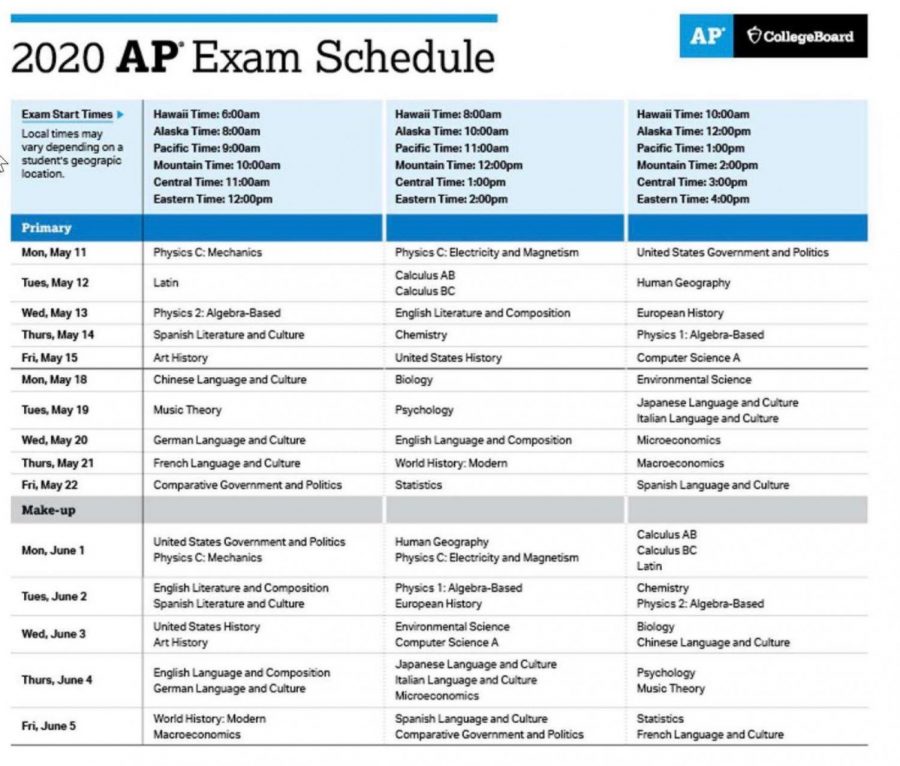Free hugs for everyone
The College Board announces AP Exam changes in response to COVID-19
April 3, 2020
Photo Courtesy of College Board
This year’s AP Exam schedule is the same, but the exams are changing.
Students registered for Advanced Placement (AP) exams in the San Dieguito Union High School District will not take their exams in the large Del Mar Fairgrounds halls or high schools but at their homes instead.
The College Board, an organization managing college entrance exams, announced plans to cancel the typical three hours and fifteen minutes in-person AP exams happening this May in light of the issues surrounding COVID-19. Instead, the test will be condensed to a 45-minute FRQ online exam accessible on any technology device.
This eliminates other methods of assessment like multiple choice and adjusts exam formats for AP exams like AP Computer Science Principles, AP Seminar, Research, and Art that will only have to submit a portfolio evaluation. The submissions will be due May 26.
More information was released on April 3 that provided specifics on the full exam schedule, free-response question types on each AP exam, and other testing information that address any concerns, especially cheating.
Given speculations around the changes, The College Board has also clarified looming questions many students share.
All the exams have cut down units in hopes that it would make up for lost instructional time and material. The schedule shows that AP exams are happening from May 11 through May 22. Alternate make up dates are on June 1-5 but it’s up to the school’s discretion and approval if there are any testing conflicts.
Each subject exam will be taken on the same day at the same time worldwide. The start time of exams will differ based on time zones. Students in the Pacific Time zone will begin at 9 a.m., 11 a.m., and 1 p.m. respectively to their AP class according to the exam schedule sent out by The College Board.
This may work favorably for students in the United States, but for international students, they may have to readjust their whole sleep schedule to take their exams at three in the morning.
Most AP exams will have one or two free response questions, with an exception to world language exams that will be solely listening and speaking. The AP History prompts will be a document based question (DBQ) with five documents. AP English Language and Composition and AP English Literature exam will test on prose and rhetorical analysis. There will be no subsequent sub scores to AP Calc AB and BC this year.
Responses will be recorded digitally with a choice to either type or write responses by hand and submit a photo using one’s cell phone. The College Board allotted an additional five minutes to upload the responses.
Exams will be open book and internet, which is only limited to search engines. No live chats or social media are allowed. Because of this, questions will be more test specific based.
A timer will be provided on the screen but it will not give a warning that it’s over. Students will have to take responsibility for managing their time during the test. Consequently, if a student submits after the time, their exam will not be counted. Students with documented accommodation will have extended time.
All AP readings for an AP score will be done online this year. Additionally, teachers will get student responses two weeks after their test so that could be used to substitute for finals given for school grading.
San Dieguito Academy Students Respond
A fluctuation of reactions ensued among San Dieguito Academy students. Some see this new chart as beneficial, while others are unsure of how they feel about the AP changes.
“Most people [I know] are really happy that they’ve shortened the test and made them online since it’s more efficient and safer,” said Ria Chockalingam, a junior taking AP exams this year.
Nathan Montanez, a senior, said he believes there isn’t a downside to the AP exam situation.
“They have essentially made the exam easier and more open ended. I will not miss taking the full exam this year. Some may argue that it is no longer representative of a college course however I don’t believe that it ever was.”
On the contrary, this adequate change is not ideal for others, Chockalingam said.
“Some people don’t like the idea that the whole test is a free response…usually a multiple choice and free response would help balance our scores. I’m mostly concerned that the curve will be bad and that forty five minutes is not enough to represent what we learned for the entire semester.”
Artin Kim, a sophomore taking AP exams for the first time this year, resonates with the same concerns over the time constraint.
“I don’t know how colleges will evaluate a forty five minute exam that only covers one section. I also do better when I have more time on tests. [Some] people do better on multiple choice exams. [Some] people do well with less time. This could also apply to students vice versa.”
The College Board may not be the Oprah of giving out free fives, but Kim said he believes that the AP exam this year acts almost like a free card.
“I am honestly not sure if colleges will evaluate the exams in the same way even if they say students are receiving credit for it. I don’t think The College Board wants to refund all the students if they chose to cancel the AP exams entirely..which is why I think colleges will value this year’s scores less and their policies might change. At the same time, it wouldn’t be fair for students taking the exam this year.”
Many seniors, along with Montanez, have shared the same sentiments about college credits.
“There is always the risk that colleges will stop giving students credit. Some of the more selective universities might change their policies,” Montanez added that his senior friends aren’t very concerned about the AP exam changes. “Most of them don’t really need to decrease the cost of potentiometer college classes anyways. They already know what they want to do in college and thus know that these are AP tests on material they will never have to worry about outside of academics.”
Going Digital
Many AP classes and teachers this semester had to readjust lesson plans and methods of communication to best prepare students for the AP exams.
Kerry Koda, an AP United States History teacher, has directed students to some videos in hopes that it would clarify the key concepts students will need to understand. In addition to the video note assignments, Koda has emphasized free response questions, particularly short answer questions (SAQ) over on her Google Meets due to the College Board’s decision to rule out the multiple choice portion.
“The time that I’m able to instruct students has been limited. The news that some of the time periods won’t be covered by the exam was very welcomed because it relieves some of the pressure that students will face. I plan to help students understand all of the events up to the time period for which they’ll be responsible by the date of the exam and we can, of course, continue learning after the AP exam has taken place,” Koda said.
Kim’s AP Physics 2 teacher has also set up video calls and meeting hours over on Google Classroom. His teacher has opened up opportunities to schedule a time to talk and have office hours like she normally would do in person.
Video calls and class instructions were mandated by the school district to make sure students are still receiving the same lesson plans, even if everything may run digitally.
Concerns have been shared and connections have felt limited, according to Koda.
“The part that frustrates me most about distance learning is that I’m not able to enjoy the live interaction that happens in a classroom. I have so many interesting, funny, and kind students; seeing their icons on a screen with microphones muted and cameras off is just not the same. I’m just not able to gauge students’ needs as well as I can when I’m in a room with them.”
In the bigger picture, there are equity concerns over technology and internet access for those who are low income.
Students who lack resources or access to the internet or device were provided chromebooks by the San Dieguito High Unified School District. San Dieguito Academy students were told to email Mr. Camacho if they do not have a device or internet services at home.
At the same time, having free internet was another issue to consider and coordinate. Some students suggest wifi hotspots and other internet devices to help them access assignments and the AP exam itself. Telecommunication companies like Spectrum have offered free access to the internet and an internet offer for students.
The College Board has also recognized the digital divide and wrote on their website that if any student needs mobile or connectivity tools, they should fill out a form and reach out to them if there are any concerns.
Addressing Cheating
Even tighter security and various anti-cheating devices and factors have been added to the exam this year.
Deep computer systems will check handwriting and typing analysis as well as tracking on social media. Not all methods of anti-cheating have been revealed so that students cannot find possible solutions to cut corners.
Open note and internet policies will be allowed for the online exam this year. The open note policy is counted as anything except group work and chats on social media, over text, calls, or videos.
The College Board hopes to mandate the same policies on misconduct a fair and secure testing environment according to their page on Exam Security.
“The AP Program maintains strict test administration and security procedures to prevent incidents or improper conduct that could disrupt the test administration or give any student an unfair advantage. Participating schools and students agree to meet all the security requirements in the AP Coordinator’s Manual, Part 2 and the Bulletin for AP Students and Parents.”
Even if cheating may be inevitable based on students choosing, assistant principal Robert Caughey said at the April Forum meeting that students would not have enough time to look up all the information during the shortened exam because it’s more application and inference based rather than a reliance on fact recalls.
Adjusting to Changes
Switching to distance learning has not only been a lifestyle shift for students but for teachers and administrators in education as well.
Despite the challenges the school may be facing, Koda effused that her classes have been adjusting to this strange situation very well and hope students take this opportunity to learn.
“I’m glad that the College Board is willing to adjust to this situation so that students won’t miss out on opportunities to advance because of forces beyond their control. Holding exams give our students the opportunity to show that they are serious about their education and are curious and focused enough to continue learning in the face of unprecedented challenges.”
In charting a new and unmarked territory like changes to the Advanced Placement exams, students like Kim hope that the education system will spark innovations and ideate changes to the current testing nature.
“Our education system needs to realize that the current testing measures have not worked. Standardized tests are just analysis and regurgitation. Some people might not be good at the test while others might thrive. I hope that changes to our education system will emphasize more on critical thinking skills and project based learning rather than regurgitation out of textbooks.”
For more information and updates, check out College Board’s AP Updates for Schools Impacted by Coronavirus, Updates for AP Students Affected by Coronavirus (COVID-19) – AP Students, and SDUHSD AP Exams. For general updates on the Coronavirus, check out the district’s announcements here.


